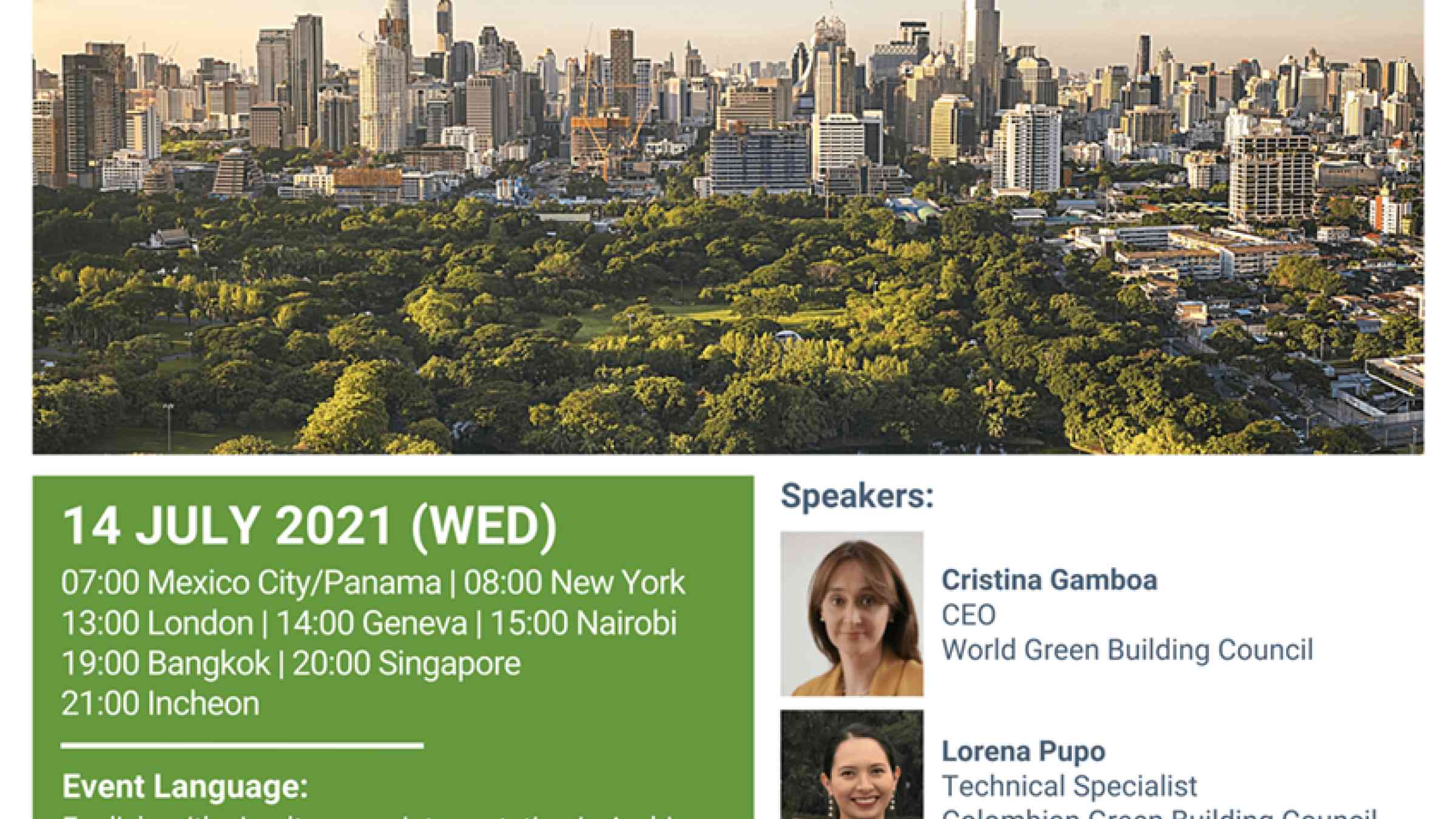[MCR2030-UNDRR-WGBC] Using rating tools to enhance building and city resilience

- English
Event Description
The building and construction sector globally represents a huge contribution to climate change and environmental issues. The sector is responsible for close to 40% of energy-related carbon emissions, plus 40% of virgin raw material use. Decarbonising, restoring our natural environment and enhancing social justice within the sector are key requirements for us to achieve sustainable development.
Building, portfolio, infrastructure and district level rating tools are recognized to be a key pathway in the road to a sustainable built environment. Despite only representing a minority portion of our built environment assets, the dozens of certification tools operated worldwide help to set appropriate levels of ambition for the wider market, and demonstrate leadership and innovation in the sector. Rating tools are run at both national, regional and global level.
Across the WorldGBC global network, over 40 rating tools are administered within the built environment at a range of geographic scales – ensuring the continual development of net zero, healthy, sustainable building and cities that enhance equity and resilience. There are a number of valuable lessons that can be learned from the global rating tool industry, relevant for building codes and policy, public health policy, urban planning and energy and sustainability master planning.
During this webinar, speakers from across the WorldGBC global network will share insights and lessons from their experience with running international rating tools, offering expertise and strategic guidance to all policy makers looking to make a difference to the environmental footprint of their buildings and cities.
Note: WorldGBC acts as a champion for all rating tools in the global network, and is a leading voice for communicating the benefits of green building. WorldGBC has always taken a neutral view towards the rating tools delivered by its member network. WorldGBC does not recommend one tool over another, and has placed trust in its member GBCs to develop quality rating tools that are best suited towards its own market.
Speakers
- Cristina Gamboa, CEO, World Green Building Council
- Lorena Pupo, Technical Specialist, Colombian Green Building Council
- Levan Ekhvaia, Manager for International Certification System, DGNB (German Sustainable Building Council)
- Davina Rooney, Chief Executive Officer, Green Building Council of Australia (GBCA)
- Katherine Hammack, Director of Special Projects, Green Business Certification Inc. (representing USGBC)
Date & Time
Date: 14 July 2021 (Wed)
Time: 7:00 Panama | 8:00 New York | 9:00 Brazil | 14:00 Geneva | 15:00 Nairobi | 19:00 Bangkok | 21:00 Incheon
Duration: 1.5 hours
Language: English, with simultaneous interpretation in Arabic, French and Spanish
Organizers
- World Green Building Council (WGBC)
- UNDRR Global Education and Training Institute (GETI)
- Making Cities Resilient 2030
About World Green Building Council (WGBC):
The World Green Building Council (WorldGBC) network catalyses the uptake of sustainable buildings for everyone, everywhere.
Transforming the building and construction sector across three strategic areas — climate action, health & wellbeing, and resources & circularity — we are a global action network of around 70 Green Building Councils around the globe.
As members of the UN Global Compact, we work with businesses, organisations and governments to drive the ambitions of the Paris Agreement and UN Global Goals for Sustainable Development. Through a systems change approach, our network is leading the industry towards a net zero carbon, healthy, equitable and resilient built environment.
Green Building Councils are independent, non-profit organisations typically made up of businesses and organisations working in the building and construction industry. As members of WorldGBC, they work to advance sustainable building and net zero best practice in their markets, as well as uniting with other Green Building Councils to achieve environmental, economic and social goals on a larger, global scale.
About the UNDRR Global Education and Training Institute (UNDRR GETI):
UNDRR GETI was established in 2010 to develop a new cadre of professionals in disaster risk reduction and climate change adaptation to build disaster resilient societies.
GETI has a global mandate to provide capacity building support to mainstream disaster risk reduction and climate change adaptation into sustainable development; convene and support inter-city learning to strengthen resilience (Making Cities Resilient); and to provide capacity building and best practice sharing support to national training institutions working on resilience issues.
Based in Incheon, the Republic of Korea, UNDRR GETI is also a global secretariat of the Making Cities Resilient 2030 (MCR2030).
About the Making Cities Resilient 2030 (MCR2030):
Making Cities Resilient 2030 (MCR2030) is a unique cross-stakeholder initiative for improving local resilience through advocacy, sharing knowledge and experiences, establishing mutually reinforcing city-to-city learning networks, injecting technical expertise, connecting multiple layers of government and building partnerships.
Through delivering a clear 3-stage roadmap to urban resilience, providing tools, access to knowledge and monitoring and reporting tools, MCR2030 will support cities on their journey to reduce risk and build resilience.
MCR2030 aims to ensure cities become inclusive, safe, resilient and sustainable by 2030, contributing directly to the achievement of Sustainable Development Goal 11 (SDG11) “Make cities and human settlements inclusive, safe, resilient and sustainable”, and other global frameworks including the Sendai Framework for Disaster Risk Reduction, the Paris Agreement and the New Urban Agenda.
Visit mcr2030.undrr.org for more information.
For more information:
MCR2030 Global Secretariat at [email protected]